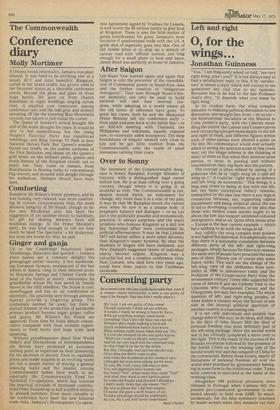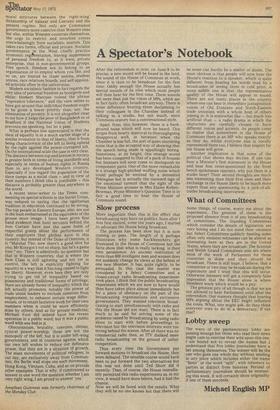Left and right
0, for the wings
• • •
Jonathan Guinness
"You," I am frequently asked, or told, "are very right wing, aren't you?" It is not always easy to find a satisfactory reply to this, if by 'satisfactory' is meant a reply which will convey to the questioner any real clue to my opinions. Recourse has to be had to the late Professor Joad's ploy, "It depends what you mean by right wing."
In its crudest form, the wing complex amounts to reducing political discussion to one dimension, one straight line, from — let us say — the International Socialists or the Maoists to Colin Jordan's party, with the Liberals straddling the centre, the Labour and Conservatives each occupying ailength immediately to the left and right of them, and different figures within each of these parties each allotted a point on the line. No commentator would ever actually admit to seeing the political scene in this crude way; yet the image inheres in the thinking of many of them so that when they mention some person, or issue, in passing and without concentration, they slip back into the pattern.
The concept is often refined by saying of a politician that he is "right wing on x and left wing on y"; it could be "right wing on defence and left wing on economics." This brings it a long step closer to being in line with real life, but the basic conceptual fallacy remains, exemplified by the idea that there is any logical connection between, say, supporting capital punishment and being sceptical about the use of aid to developing countries, or the idea that those who believe trade unions ought to be above the law also support unlimited coloured immigration, and so on. Quite often issues arise — Europe is the best current example — which have nothing to do with the wings at all.
Any validity the wing complex does possess is not logical but historical. It is empirically true that there is a noticeable correlation between different parts of the leftand right-wing packages, simply because for historical reasons the same sets of people have preached the same sets of ideas. History can of course play some funny tricks. Two such are the change of the left-wing view of the Afrikaners from sympathy in 1900 to abhorrence today and the evolution of the Conservative Party from the seventeenth-century Tories who supported the cause of James II and the Catholic Irish to the Unionists who championed Carson and the Orangemen, are only two examples. The whole question of leftand right-wing peoples, of what makes a country enjoy the favour of one side in the internal political spectrum of another country is a fascinating one. It is not only individuals and peoples that change sides in this way; so do ideas, and ideals. In the days of John Stuart Mill the ideal of personal freedom was most definitely part of the left-wing package. Since the second world war it has virtually completed a move over to the right. This is the result of the success of the Russian revolution followed by the presence of the Soviet Union on the winning side of the second world war and the conquest of China by the communists. Before these events, nearly all limitations of personal freedom all over the world were practised by governments belonging in some form to the traditional order. Today most coercion is exercised in the name of the working class.
Altogether 180 political prisoners were released in Portugal when Caelano fell; the present pro-Communist government is estimated already to hold over 3,000. So much, incidentally, for the false symmetry practised by leader-writers when they measure out their
moral strictures between the 'right-wing' dictatorship of Salazar and Caetano and the present regime. Not only are Communist governments more coercive than Western ones but also, within Western countries themselves, the urge to restrict and interfere comes overwhelmingly from socialistic sources. This takes two forms, official and private. Socialist governments in the West chiefly practice economic regithentatign, leaving suppression of personal freedom to, as it were, private enterprise, that is non-governmental groups. Free speech, freedom not to belong to an Organisation or to employ whom you like, and so on, are limited by trade unions, student unions, race relations boards, and self-appointed activists often in the universities.
Modern socialistic fashion in fact regards the very idea of personal freedom as bourgeois and elitist; Herbert Marcuse coined the phrase "repressive tolerance," and the view seems to have got around that individual freedom ought to be given a lower priority than, say, the elimination of poverty. It is not altogether clear to me how it helps the poor of Bangladesh or of Bradford if the National Union of Students prevents me speaking, but let it pass. What is perhaps less appreciated is that the ideal of equality is in a much earlier stage of a Similar evolution to that of liberty, that is from being characteristic of the left to being upheld by the right against the power-corrupted left. On the international scale the case is very clear. The distance between top and bottom in society is greater both in terms of Living standards and especially in terms of human rights in Russia than in any developed Western country. Especially if you regard the population of the slave camps as a social class — and in view of their numbers I think this is justifiable — this distance is probably greater than anywhere in the world.
A recent letter-writer to the Times, commenting on special schools in the Soviet Union, was reduced to saying that the egalitarian tradition in education continued to be strong. The top people in Eastern Europe, also, are not in the least embarrassed at the equivalent of the grouse moor image. I have been given first hand evidence that hunt servants behind the Iron Curtain have just the same habit of respectful gossip about the performance of their employers that ghillies have in this country; but instead of the Duke of Omnium, it is "Marshal Tito, now there's a good shot for you; Mr Kosygin's not so sharp, but he's a game trier," etc. There is admittedly no question but that in Western countries, that is where the New Class is still agitating and not yet in control, the left is explicitly fighting for equality in a way that it has long ceased to fight for liberty. However, even here they are only trying to get rid of inequality based on possessions and traditional forms of privilege; there are already forms of inequality which the left actually promotes, notably the power of trade union leaders to exclude someone from employment, to enhance certain wage differentials, or to retain lucrative work for their own members when it could be more efficiently done by others. And as for private medicine; Michael Foot did indeed have his recent operation in a public ward; but it was a public ward with one bed in it.
Obscurantism, brutality, coercion, elitism, cynical power-worship; these are not the monopoly of the left, but it is under left-wing governments, and in countries against which our own left wishes to reduce our defensive power, that they are in a situation of growth. The mass movements of political refugees, in our day, are exclusively away from Communism; the Berlin wall stops one such movement, Hong Kong, Vietnam, Cuba, and so on provide other examples. That is why, if constrained to answer in one word the question whether I am very right wing, I am proud to answer 'yes.'



























 Previous page
Previous page